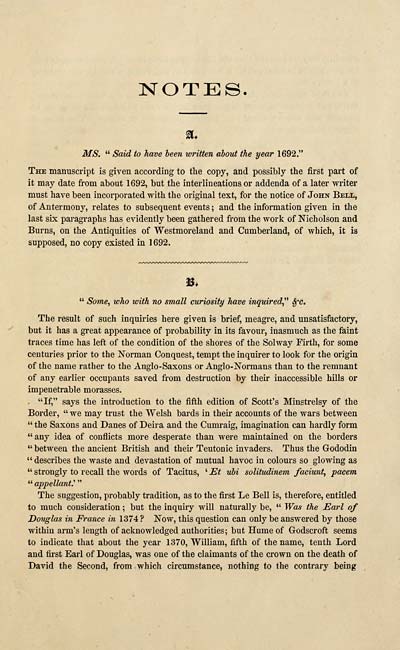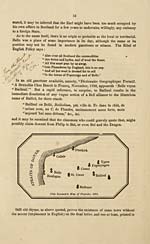Memorial of the Clan of the Bells
(21) Page 15
Download files
Complete book:
Individual page:
Thumbnail gallery: Grid view | List view

NOTES.
MS. " Said to have been written about the year 1692."
The manuscript is given according to the copy, and possibly the first part of
it may date from about 1692, but the interlineations or addenda of a later writer
must have been incorporated with the original text, for the notice of John Bell,
of Antermony, relates to subsequent events ; and the information given in the
last six paragraphs has evidently been gathered from the work of Nicholson and
Burns, on the Antiquities of Westmoreland and Cumberland, of which, it is
supposed, no copy existed in 1 692.
" Some, who with no small curiosity have inquired" 8fC.
The result of such inquiries here given is brief, meagre, and unsatisfactory,
but it has a great appearance of probability in its favour, inasmuch as the faint
traces time has left of the condition of the shores of the Solway Firth, for some
centuries prior to the Norman Conquest, tempt the inquirer to look for the origin
of the name rather to the Anglo-Saxons or Anglo-Normans than to the remnant
of any earlier occupants saved from destruction by their inaccessible hills or
impenetrable morasses.
. "If," says the introduction to the fifth edition of Scott's Minstrelsy of the
Border, " we may trust the Welsh bards in their accounts of the wars between
" the Saxons and Danes of Deira and the Cumraig, imagination can hardly form
"any idea of conflicts more desperate than were maintained on the borders
" between the ancient British and their Teutonic invaders. Thus the Gododin
" describes the waste and devastation of mutual havoc in colours so glowing as
" strongly to recall the words of Tacitus, ' Et ubi solitudinem faciunt, pacem
" appellant.' "
The suggestion, probably tradition, as to the first Le Bell is, therefore, entitled
to much consideration ; but the inquiry will naturally be, " Was the Earl of
Douglas in France in 1374 ? Now, this question can only be answered by those
within arm's length of acknowledged authorities; but Hume of Godscroft seems
to indicate that about the year 1370, William, fifth of the name, tenth Lord
and first Earl of Douglas, was one of the claimants of the crown on the death of
David the Second, from which circumstance, nothing to the contrary being
MS. " Said to have been written about the year 1692."
The manuscript is given according to the copy, and possibly the first part of
it may date from about 1692, but the interlineations or addenda of a later writer
must have been incorporated with the original text, for the notice of John Bell,
of Antermony, relates to subsequent events ; and the information given in the
last six paragraphs has evidently been gathered from the work of Nicholson and
Burns, on the Antiquities of Westmoreland and Cumberland, of which, it is
supposed, no copy existed in 1 692.
" Some, who with no small curiosity have inquired" 8fC.
The result of such inquiries here given is brief, meagre, and unsatisfactory,
but it has a great appearance of probability in its favour, inasmuch as the faint
traces time has left of the condition of the shores of the Solway Firth, for some
centuries prior to the Norman Conquest, tempt the inquirer to look for the origin
of the name rather to the Anglo-Saxons or Anglo-Normans than to the remnant
of any earlier occupants saved from destruction by their inaccessible hills or
impenetrable morasses.
. "If," says the introduction to the fifth edition of Scott's Minstrelsy of the
Border, " we may trust the Welsh bards in their accounts of the wars between
" the Saxons and Danes of Deira and the Cumraig, imagination can hardly form
"any idea of conflicts more desperate than were maintained on the borders
" between the ancient British and their Teutonic invaders. Thus the Gododin
" describes the waste and devastation of mutual havoc in colours so glowing as
" strongly to recall the words of Tacitus, ' Et ubi solitudinem faciunt, pacem
" appellant.' "
The suggestion, probably tradition, as to the first Le Bell is, therefore, entitled
to much consideration ; but the inquiry will naturally be, " Was the Earl of
Douglas in France in 1374 ? Now, this question can only be answered by those
within arm's length of acknowledged authorities; but Hume of Godscroft seems
to indicate that about the year 1370, William, fifth of the name, tenth Lord
and first Earl of Douglas, was one of the claimants of the crown on the death of
David the Second, from which circumstance, nothing to the contrary being
Set display mode to:
![]() Universal Viewer |
Universal Viewer | ![]() Mirador |
Large image | Transcription
Mirador |
Large image | Transcription
Images and transcriptions on this page, including medium image downloads, may be used under the Creative Commons Attribution 4.0 International Licence unless otherwise stated. ![]()
| Histories of Scottish families > Memorial of the Clan of the Bells > (21) Page 15 |
|---|
| Permanent URL | https://digital.nls.uk/94952490 |
|---|
| Description | A selection of almost 400 printed items relating to the history of Scottish families, mostly dating from the 19th and early 20th centuries. Includes memoirs, genealogies and clan histories, with a few produced by emigrant families. The earliest family history goes back to AD 916. |
|---|

